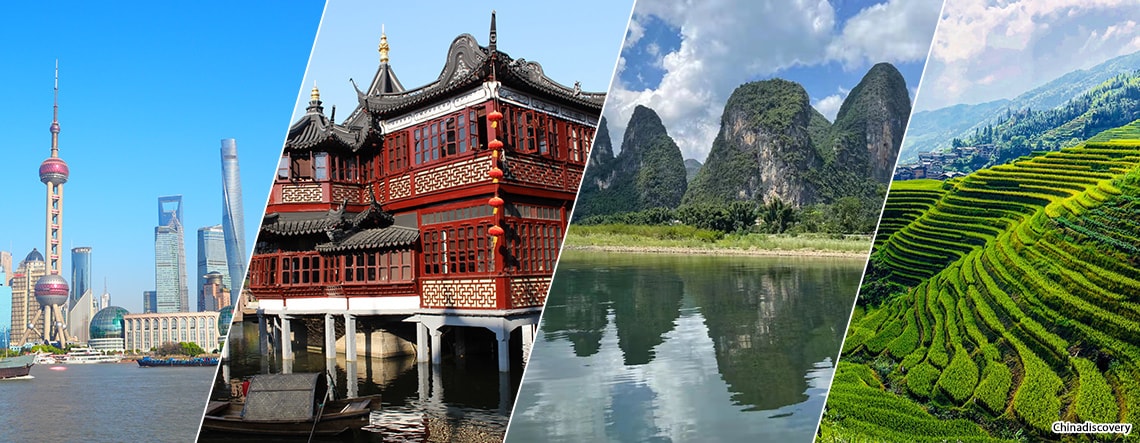20 Great Tips For Deciding On China Tour Websites
20 Great Tips For Deciding On China Tour Websites
Blog Article
Top 10 Tips On Exploring Regional Cuisines In China
1. Learn about the eight Culinary CulturesTip. Familiarize yourself the eight main Chinese cuisines: Sichuan Cantonese Hunan Anhui Fujian Fujian Fujian Each has its distinctive flavors, techniques, and dishes.
It is possible to plan your culinary excursion based on your preferences.
Con: It can be overwhelming to remember the nuances of each dish.
2. Take advantage of the local cuisine
Explore the most popular dishes from the area you are visiting. For example, you can try Peking Duck or Xiaolongbao (Shanghai) in Beijing as well as Hot Pot (Chengdu).
Pros: The experience will be authentic and rich in culture.
Cons: You could be limited in the food choices you can make while you're in a specific region.
3. Note regional tastes
Tips: Sichuan cuisine is spicy and numbing. Cantonese food is refreshing and light while Jiangsu dishes are delicate and sweet. Select dishes according to your preferences and tolerance for spice.
Pro: Helps you avoid eating out at restaurants that aren't suitable for your taste.
Pros: Certain flavors might require experimentation and an acquired taste.
4. Explore Street Food
Be adventurous and try local snacks. Explore local cuisines.
Pro: Street food offers an inexpensive and easy way to sample local cuisine. It also offers an insight into the daily lives of the people.
Con: Hygiene concerns can occur at times. Select vendors who do a lot of business.
5. Learn Basic Dining Etiquette
Tip - Understand Chinese eating habits, such as sharing with family members and avoid placing chopsticks vertically into rice.
Pro Improves the dining experience and honors local traditions.
Con: Took some time to adapt to unfamiliar manners.
6. Ask locals for recommendations.
Locals are often able to give you an idea of the top places to eat or dishes in particular areas. Do not be afraid to ask assistance.
The greatest thing is that you will find hidden gems, not just tourist traps.
Con: Communication may be difficult because of language barriers.
7. Be open to unfamiliar ingredients
Explore regional cuisines using unusual ingredients such as bamboo shoots, tofu that smells, or lotus root. Approach new foods with curiosity.
Pros: Increases your knowledge of Chinese food culture.
Con: Certain dishes might not be suitable for your taste buds or dietary restrictions.
8. Allowing Dietary Restriction
Learn Mandarin phrases that can be used to convey preferences and allergies.
Pro: Customized dining experience to suit your requirements.
Cons: Certain foods can be restricted in their choices for people who have certain food restrictions.
9. Pair Food and Drinks Regionally
Drink local drinks like Shaoxing tea, wine and baijiu in the north of China.
Pro: Complements the cuisine and adds depth to the experience.
Con: Strong flavors such as baijiu, for example, might not be for everyone.
10. Avoid Overordering
Tip: Chinese meals are usually served in a family-style setting. Take your time ordering, and then increase as needed.
Pros: Reducing food waste. Lets you try several recipes.
Cons: The variety of items available makes it tempting to purchase too many.
Benefits of exploring regional food styles in China
Different Flavors - Taste an incredible range of tastes, ingredients, and techniques.
Cultural Insights : Develop an understanding of regional identities and customs.
The price of many local meals is reasonably priced.
A memorable experience: The flavor of famous dishes in their original location can create memories that will last a lifetime.
The cons of Exploring Chinese Regional Cuisine
Hygiene Issues: Some street food or small restaurants may not meet the international standards for cleanliness.
Language Barriers: Menus and explanations may only be in Mandarin which makes it difficult to order.
Unfamiliar Ingredients: Certain flavors or textures may be challenging for certain people.
In some regions, strict vegetarians, people who suffer from food allergies, as well as vegans might have issues.
If you stick to these suggestions and are adventurous then you'll be able to explore the numerous delicious regional Chinese dishes, while navigating the difficulties. View the most popular learn why this spot is so famous for site tips including the origin and history of the mysterious chinese dragon, anren ancient town, kashgar tour maps, splendid china tour.html, lijiang tour maps, weaponry of iron age iron cannon iron armour and warships, honey lake country club, guanlin temple, shopping in fuzhou, chinese wood carving originated in neolithic period and more.
Top 10 Tips On Cultural Respect When Visiting Famous Temples In China
1. Tip: Every temple has its own rules and rituals. Respect local customs and adhere to them, regardless of whether they're bowing or offering incense during ceremonies.
Pro: It displays a lot of respect to the temple and it's religious practices.
Cons: Temple rituals and etiquette may be confusing if you are unfamiliar with them.
2. Dress modestly
Tips: Dress conservatively and cover shoulders, arms, and legs. Visitors who would like to cover themselves may be given shawls and scarves by some temples.
Pro: Shows respect for sacred spaces and is respectful of locals.
Con: It is uncomfortable in the hot summer months. It is important to wear extra clothing.
3. Be calm and quiet.
Tips: Maintain a calm and calm manner, particularly in sacred areas. Talk in a calm manner and avoid noisy discussions.
Pro: Shows respect for worshipers by preserving the sacredness and sanctity in the area.
Con: Silence may seem awkward or uncomfortable in tourist areas with a lot of activity.
4. Avoid Disrupting Worshippers
Do not interfere with someone who is in a state of prayer or meditation. Give them the space and time to complete their rituals.
Pro: Shows consideration for the spiritual practices of others.
Con: Though you may be tempted by the prospect of talking to the congregation, it's crucial to remain focused.
5. Don't touch sacred objects.
Do not touch statues and sacred objects unless specific permission is given. They are generally considered to be sacred.
Pro: Preserves the holiness of the temple and respects cultural practices.
Cons: You might be tempted to get close to objects in order to photograph them or simply out of curiosity.
6. The Elders Deserve Respect
Tip. Many temples, the people who are older in society are thought to be respected. If you interact with them, make sure to be courteous and respectful.
Pro: Respecting elders is an important tradition that must be honored.
Con: It may seem strange if you're from a society that values respect and isn't dependent on age.
7. Get the direction of the locals.
If you're not sure regarding the correct manner of conduct, take a look at how locals conduct themselves and emulate the same guidelines, whether in regards to how they make offerings or walk.
Pro: Blends in well and helps you avoid make mistakes.
Con: It could take some time to watch in order to fully comprehend what's going on.
8. You should seek permission before you take photos.
Be sure to ask permission before taking photos in any area and especially in places which are populated by people praying. Some temples may prohibit photography entirely.
Pro: Shows respect for people's privacy and the sacredness of the space.
Con: Not taking advantage of photo opportunities can be a problem, especially in areas with amazing sceneries.
9. Make Offerings Humble and Respectful
Tips: If you want to make an offering (flowers or incense, fruits, etc.) Keep it simple and humble. Avoid giving extravagant gifts unless necessary for a special event.
Pro: Aligns itself to local customs.
Cons: You might not feel confident about what you should be offering without the help of a local expert.
10. Be Mindful of Your Behavior and Language
Tip: Always maintain an appropriate and calm manner. Beware of inappropriate language or laughing in sacred spaces.
Pro: It can help create a peaceful and respectful environment between all visitors and believers.
Con: It's essential to keep your cool even when you want to be joking or taking a relaxed attitude.
Chinese Temples: Cultural Respect is an advantage.
Positive Relations with Locals If you show respect to cultures and respect, you can build positive relationships with people whom you meet.
Deepened Cultural Understanding: Shows the desire to understand and be immersed into Chinese culture.
A Memorable Experience: Engaging in a respectful manner in the temple's tradition creates an enjoyable and meaningful experience.
Avoiding blunders: If you adhere to the rules of your culture, you will be careful not to violate sacred sites or people. You will be able to enjoy a better time during your visit.
A greater sense of spiritual sensitivity: Being respectful can increase your awareness of the practices of spirituality and practices of the region. This can give you greater sense of connection.
Cons of Culture Observance in Chinese Temples
Cultural Misunderstanding : If do not have the necessary information, you could be able to make mistakes with the manner of your temple and cause discomfort.
Physical Discomfort Dressing modestly in hot weather and adhering religious rituals can cause some discomfort for a short period of time.
It is possible to feel restricted in your choices if you have to adhere to strict rules (e.g. no speaking or photography).
It may take a long time to master the customs of a temple or observe rituals. This can impact the overall itinerary of your tour.
Language Barriers: It can be challenging to comprehend certain practices or request permission if you have an issue with your language.
You'll not only have a more fulfilling and rewarding experience in China's temples if you follow these suggestions, but you will also aid in the preservation of the ancient traditions and sacredness of these holy places. Read the best experience this world-renowned landmark for blog advice including guilin travel tips, chaotianmen dock%EF%BC%8C a major water transportation hub in chongqing, eating in zhengzhou, tours for the disabled, eating in guilin, blue dragon temple, kashgar tour maps, zhangjiajie tour maps, wuxi a shining pearl of taihu lake, eating in taiyuan and more.